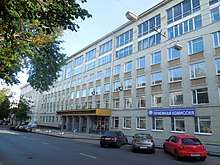N. A. Dobrolyubova State Linguistic University of Nizhny Novgorod
|
Нижегородский государственный лингвистический университет имени Н. А. Добролюбова | |
 | |
Former name | Gorky Pedagogical Institute of Foreign Languages |
|---|---|
| Type | University of Higher Education |
| Established | 1937 |
| Rector | Boris Zhigaliev |
| Location |
Nizhny Novgorod, Nizhny Novgorod Oblast, Russia 56°19′29″N 44°01′42″E / 56.32472°N 44.02833°ECoordinates: 56°19′29″N 44°01′42″E / 56.32472°N 44.02833°E |
| Language | Russian |
| Website | http://www.lunn.ru/en |
N. A. Dobrolyubova State Linguistic University of Nizhny Novgorod is an institution of higher education in the city of Nizhny Novgorod, Russia, and it is one of four linguistic universities in Russia. The institution was established in the year 1937 as the Gorky Pedagogical Institute of Foreign Languages.[1]
History
In 1917, at Nizhny Novgorod Gubono, the highest provincial courses of foreign languages were organized. In 1937, based on the courses, the Gorky Pedagogical Institute of Foreign Languages was founded. The first buildings of the Institute (modern buildings No. 1 and No. 2) were built in 1948 on the site of the destroyed Troitskaya Verkhneposadskaya Church on the Old Hay (Staraya) Square (1844). Before the construction of these two buildings, the Institute was located in the building of the former 3rd female gymnasium in Chernoprudsky Lane (currently the Zhukovsky Library). At present, the buildings of the university (only 4 buildings) occupy the entire space of the former Starosnaya Square and the underground space below it.
Initially, the Institute trained teachers of English, German, French and Spanish for secondary schools and had, respectively, three faculties: English, German and Romance languages. Linguists were also trained at the correspondence department.
In 1964, the Faculty of Translation of Western European languages was established.
In the 1990s a large number of new faculties and departments were created, in 1994 the institute was given the status of a linguistic university.



